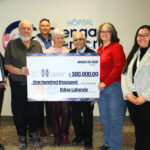
Photo by Karolina Grabowska on <a href="https://www.pexels.com/photo/person-wearing-blue-and-black-stethoscope-5207102/" rel="nofollow">Pexels.com</a>
Cardiology plays an essential role in treating many heart-related or chest-related conditions, including arrhythmias (irregular heartbeat), angina (chest pain stemming from constriction in the coronary arteries), oedema (accumulation of fluid), cardiomyopathy (disease of the heart muscle), diseases of the arteries, hole in the heart, and many more. This medical field is at the the cutting edge of advanced therapies and innovations. It caters to emergency services as well as palliative care for patients with terminal heart disorders.
Cardiology has a significant presence in the medical field in so many regions of the world. Unfortunately, patientsdo not seek out their help, instead waiting until there are sudden heart crises, before taking action, whichoften can be too late. Foreigners with heart-related challenges living in Singapore can find it harder to finda cardiologist that they can work with. However, this comprehensive guide bridges that gap between patients and cardiologists in Singapore. It answers several questions, including the following:
- When to consult a cardiologist
- Different types of cardiologists
- Finding the best cardiologists in Singapore that cater to several heart-related problems.
- Cost of treatment and health insurance options.
When to See a Cardiologist in Singapore
Heart disease is one of the leading causes of death worldwide. A majority of the fatal crises experienced could be averted if earlier action was taken, including medical examinations. Waiting for a crisis to occur increases your risk of fatality when an attack occurs. Hence, under the following circumstances, an individual must consult the medical expertise of a cardiologist.
- When one experiences chest pain. Heart problems often result in chest pain. This is a sign that cannot be ignored. A cardiologist can identify the source of the problem and provide appropriate treatment.
- High blood pressure (140/90 and above) may point to a heart problem. This condition causes damage to the blood vessels, which may lead to stroke or heart attack.
- Diabetes. This medical condition shares a bond with cardiovascular disease. Diabetes significantly increases the risk of heart disease.
- Palpitation, shortness of breath, and dizziness. When experienced, one must see a cardiologist immediately.
- High cholesterol tends to cause blockages in the arteries, which puts the individual at risk of having a heart attack and stroke.
- Unhealthy habits contribute as well to cardiovascular diseases, including smoking and alcohol abuse. If susceptible to these acts, contacting a cardiologist will be ideal.
Other factors exist as well, including high Body Mass Index (BMI), medical history showing kidney disease, peripheral arterial disease, and heart disease.
Types of Cardiologists in Singapore
Most cardiologists in Singapore are well trained andhave in-depth knowledge of the cardiovascular system, including the heart, veins, and arteries. In Singapore, cardiologists fall into three categories:
- Non-invasive cardiologists
- Interventional cardiologists
- Electrophysiologists (EP)
Non-Invasive Cardiologists
These cardiologists manage all heart conditions, averting and managing cardiovascular issues, including heart failure and hypertension. Part of their roles includes conducting medical cardiac screening examinations, such as fitness tests and magnetic resonance imagine (MRI) scans to detect heart problems.
Interventional Cardiologists
Interventional or invasive cardiologists conduct catheterizations or “angioplasties.” To look at the heart arteries and open up blockages with stents.
Electrophysiologists
Electrophysiologists work on the heart electrical system.They use drugs, pacemakers and a technique called ablation to treat heart rhythm problems.
Finding the Best Cardiologists in Singapore
Before conducting a search on which heart clinic to visit, it is essential to consider the following factors:
- The evaluation of time and convenience against cost.
- The type of cardiologists required for examination or treatment.
The first part dwells on choosing between a public clinic or a private hospital. The former provides treatment at lower costs but compromises time. Long wait hours tend to be the order of the day. For example, the wait time to have an appointment with a heart doctor at NHC can range from four to six weeks. There are no walk-ins as well. The latter provides immediate medical responses, but with higher fees. Securing an appointment may be the same day or the next. Likewise, walk-in patients are welcomed.
All cardiologists can deal with all conditions. If you need a specialist procedure your cardiologist will bring in the correct doctor to help.For example, an angioplasty procedure would require the services of an invasive heart doctor.
The General Cost Implications of Seeing a Cardiologist in Singapore
Private cardiologists charge anywhere between $150 to $400 for the first appointment. Medical treatments cost varies depending on what is needed. Singaporeans are entitled to national health care services. As such, they may pay $57 for the first consultation and $38 for follow up, compared to foreigners who may seek private medical care. Are there subsidies available for patients in need of cardiovascular treatment in Singapore? Of course, there are. However, here are the conditions of enjoying such benefits:
- Become a Singaporean or hold a permanent resident (National Registration Identity Card – NRIC)
- Obtain a referral letter from either a Singapore Armed Forces (SAF) officer/camp or a polyclinic.
It is worth mentioning that not all people qualify for such benefits, including all foreigners, individuals with referrals from a private doctor or clinic, and those referred to consult a specific heart doctor. Hence, foreigners are subjected to the standard fee when visiting cardiologists in Singapore. Foreigners can apply for permanent residence.
In Conclusion
Foreigners, including tourists and expatriates, can enjoy medical attention and service concerning cardiovascular-related problems from clinics in Singapore. All that is required is to locate an experienced cardiologist who can provide the care required for a specific heart condition.












